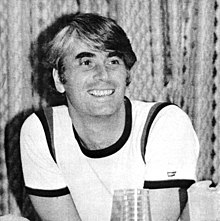
Back Robert Nozick Afrikaans روبرت نوزيك Arabic روبرت نوزيك ARZ Robert Nozik Azerbaijani رابرت نوزیک AZB Robert Nozick Catalan ڕۆبێرت نۆزیک CKB Robert Nozick Czech Robert Nozick Welsh Robert Nozick Danish
Robert Nozick | |
|---|---|
 Nozick in 1977 | |
| Born | November 16, 1938 New York City, U.S. |
| Died | January 23, 2002 (aged 63) Cambridge, Massachusetts, U.S. |
| Education | Columbia University (BA) Princeton University (PhD) Oxford University |
| Era | 20th-century philosophy |
| Region | Western philosophy |
| School | Analytic Libertarianism |
| Doctoral advisors | Carl Gustav Hempel |
Main interests | Political philosophy, ethics, epistemology |
Notable ideas | Utility monster, experience machine, entitlement theory of justice, Nozick's Lockean proviso,[1] Wilt Chamberlain argument, paradox of deontology,[2] deductive closure, Nozick's four conditions on knowledge, rejection of the principle of epistemic closure |
| This article is part of a series on |
| Libertarianism in the United States |
|---|
 |
Robert Nozick (/ˈnoʊzɪk/; November 16, 1938 – January 23, 2002) was an American philosopher. He held the Joseph Pellegrino University Professorship at Harvard University,[3] and was president of the American Philosophical Association. He is best known for his book Anarchy, State, and Utopia (1974), a libertarian answer to John Rawls' A Theory of Justice (1971), in which Nozick proposes his minimal state as the only justifiable form of government. His later work Philosophical Explanations (1981) advanced notable epistemological claims, namely his counterfactual theory of knowledge. It won the Phi Beta Kappa Society's Ralph Waldo Emerson Award the following year.
Nozick's other work involved ethics, decision theory, philosophy of mind, metaphysics and epistemology. His final work before his death, Invariances (2001), introduced his theory of evolutionary cosmology, by which he argues invariances, and hence objectivity itself, emerged through evolution across possible worlds.[4]
- ^ Mack, Eric (May 30, 2019). "Robert Nozick's Political Philosophy". In Zalta, Edward N. (ed.). The Stanford Encyclopedia of Philosophy. Metaphysics Research Lab, Stanford University. Archived from the original on April 25, 2023. Retrieved May 30, 2019 – via Stanford Encyclopedia of Philosophy.
- ^ "How can a concern for the non-violation of C [i.e. some deontological constraint] lead to refusal to violate C even when this would prevent other more extensive violations of C?": Robert Nozick, Anarchy, State and Utopia, Basic Books (1974), p. 30 as quoted by Ulrike Heuer, "Paradox of Deontology, Revisited", in: Mark Timmons (ed.), Oxford Studies in Normative Ethics. Oxford University Press (2011).
- ^ "Robert Nozick, 1938–2002". Archived April 12, 2019, at the Wayback Machine Proceedings and Addresses of the American Philosophical Association, November 2002: 76(2).
- ^ Dictionary of Modern American Philosophers, Volume 1, edited by John R. Shook, Thoemmes Press, 2005, p.1838